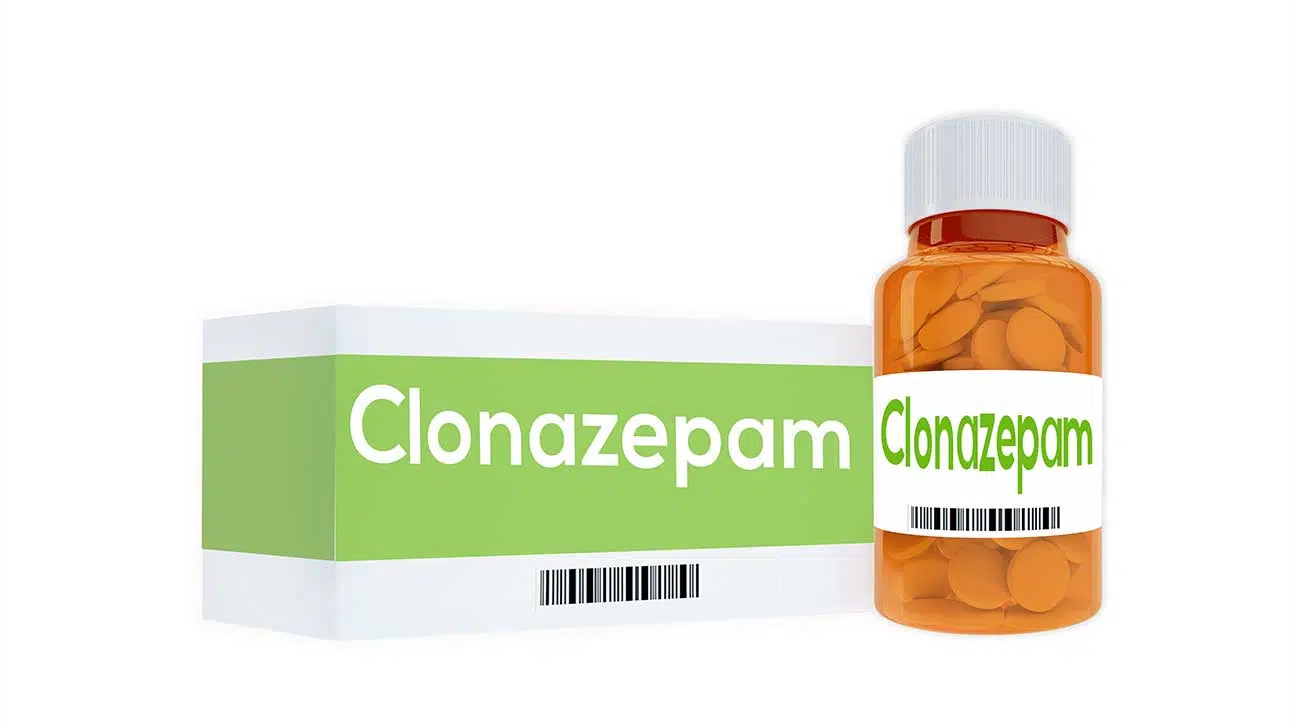
Clonazepam, better known by its brand name Klonopin, is a benzodiazepine that has anticonvulsant, hypnotic, muscle relaxant, and sedative effects.
Klonopin is FDA-approved to treat epilepsy, seizures, panic disorders, anxiety disorders, and panic attacks.
The medication works by interacting with your central nervous system (CNS) and increasing the effects of a certain neurotransmitter your brain naturally releases when feeling panicked.
Specifically, Klonopin increases the effects of gamma-aminobutyric acid (GABA). This is why the medication is effective in reducing feelings of anxiety. Clonazepam can be used short-term or long-term depending on your individual needs.
However, if you’re taking Klonopin for a long period of time, it’s important to know that you can develop a benzodiazepine tolerance, much like with other prescription drugs. In other words, you’ll need a higher dose of Klonopin to feel its effects.
How Clonazepam Tolerance May Develop
There are a few factors that can contribute to an increased tolerance for clonazepam.
Long-Term Use
First, long-term use can make it much more likely that you develop a tolerance. Long-term treatment is typically common, since Klonopin is used to treat mental health conditions.
Repeated exposure to the medication allows your brain to adjust to its effects. As a result, it will need more Klonopin to feel its benefits.
Higher Doses
Another factor that can lead to building your tolerance to clonazepam is taking higher doses. When taking any kind of prescription medication, it’s recommended to start with a low dosage and build up to a higher one if necessary.
That being said, if you start with high doses and continue to take them, your tolerance will likely build much faster.
However, taking a higher dose does not mean your body can process a higher dose. Having a high tolerance can lead you to take an unsafe dose of Klonopin.
Chronic Use
Similar to long-term use, chronic use can also increase your tolerance to Klonopin. Chronic use is usually common for people with chronic medical issues such as epilepsy.
If you have a condition that will require you to be on medication indefinitely, it’s inevitable that your tolerance will increase over time.
Unfortunately, chronic use can lead to both Klonopin addiction and dependence.
Do You Build Up A Tolerance To Klonopin If You Take It Every Day?
Use of benzodiazepines can lead to the development of a tolerance fairly quickly. If you take the medication every day, it is likely that you will build up a tolerance.
But how quickly can that happen? You can start to develop a tolerance to all benzos in as little as days to weeks.
This is another reason it’s important to start with a low dose if you are still able to feel the effects of benzodiazepines with this dosage.
Effects Of Klonopin Tolerance
There are some negative side effects associated with developing a Klonopin tolerance, including the following.
Physical Dependence
One common complication linked to Klonopin tolerance is developing a physical dependence on the medication.
As you need higher doses to feel the effects of the drug, your brain may become reliant on the chemical changes wrought by Klonopin.
As a result, you may notice negative physical effects if you stop taking the medication.
Reduced Sedative-Hypnotic Effect
Another effect of Klonopin tolerance is reduced sedative-hypnotic effect.
The sedation part of this drug reduces tensions and calms negative feelings while the hypnotic effect allows you to sleep.
As you build up a tolerance to Klonopin, you may find that both sedative and hypnotic effects are reduced.
Tapering Klonopin To Decrease Tolerance
One common tactic used to decrease tolerance to medications is tapering. Tapering involves slowly reducing the amount of the drug you take.
It’s vital that you have a healthcare professional assist and monitor you during this process as they start prescribing smaller doses. As a disclaimer, it’s important to note that this has to be a very gradual process.
Due to the fact that your body has gotten used to a specific amount of Klonopin, it can take time for it to adjust to lower doses.
In order to avoid the negative effects of reducing your dose, you and your doctor will lower your dose in small amounts.
How Benzodiazepine Tolerance Affects Withdrawal
Developing a tolerance can lead to physical dependence on clonazepam.
When it comes to physical dependence, you will often notice benzodiazepine withdrawal symptoms if you take smaller doses or stop taking your medication entirely.
Withdrawal syndrome refers to a list of adverse effects, such as cravings for Klonopin, your body has in reaction to not getting the drug.
Treatment Programs For Benzodiazepine Addiction
Addiction to benzodiazepines is a serious condition that can be life-threatening and requires support from a medical professional.
Specifically, finding a substance use disorder treatment facility can be particularly beneficial in helping you detox and the discontinuation of medication.
It’s essential to address that addiction is not specific to clonazepam.
You could develop cross-tolerance and adjacent addictions to other common benzos, such as alprazolam (Xanax), diazepam (Valium), and lorazepam (Ativan).
If you’re having a hard time starting the search for a treatment center, check out AddictionResource.net. We can help you find the best treatment options in your area.
Whether you’re looking for an addiction treatment center that’s LGBTQ-friendly, Christian, Spanish-speaking, non-religious, etc., we can help you find a qualified location nearby.
Find A Substance Abuse Treatment Program
Are you ready to take the first step in recovering from drug use? Call our helpline at AddictionResource.net today.
Addiction Resource aims to provide only the most current, accurate information in regards to addiction and addiction treatment, which means we only reference the most credible sources available.
These include peer-reviewed journals, government entities and academic institutions, and leaders in addiction healthcare and advocacy. Learn more about how we safeguard our content by viewing our editorial policy.
- U.S. National Library of Medicine: Medline Plus — Clonazepam
https://medlineplus.gov/druginfo/meds/a682279.html - National Institute on Drug Abuse (NIDA) — Benzodiazepines and Opioids
https://nida.nih.gov/drug-topics/opioids/benzodiazepines-opioids - StatPearls — Clonazepam
https://www.ncbi.nlm.nih.gov/books/NBK556010/


